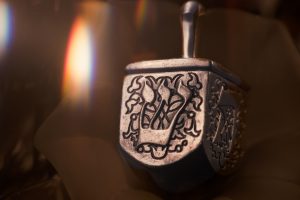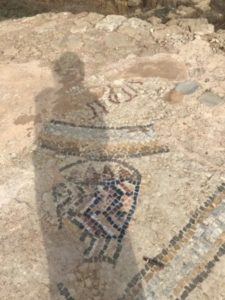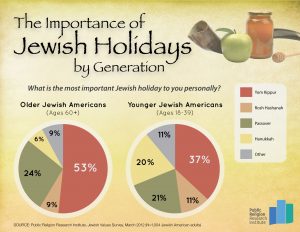Excerpts on the Rosh HaShanah Musaf Amidah, taken from Michael Strassfeld’s “The Jewish Holidays – A Guide and Commentary”
“Malkhuyot: There are many places where habits or people rather than G-d are king. There are certain people in whose presence I cannot be myself. They have the power to flatten out my heart. This is the issue of malkhuyot.
Zikhronot: The issue of zikhronot is that there are memories I cannot let go of even though they are no longer appropriate. Having places certain resentments in my memory bank, I have difficulty removing them.
Shofarot: This has to do with shipur (from the same root as shofar) ma’asekha – improve your deeds. I must examine the issues in my life to discover which changes are necessary, because without them my life is too terrible to live. Unless I write myself into the Book of Life, I am certainly not going to live for another year. I must renew my will to live. Each of us must try to write a page in the Book of Life, consisting of what we desire in the coming year”(Zalman Schachter-Shalomi 101).
“The three major themes of the Rosh HaShanah musaf are most frequently spoken of as reflecting three important aspects of G-d and theology. The first,malkhuyot – sovereignty – proclaims G-d’s sovereignty over the world as humanity. The second, zikhronot – remembrance – tells us the G-d cares about the world and remembers all our deeds, both the good and the bad. The third,shofarot, reminds us of the revelation of G-d at Sinai and of the final redemption still to come. Together they ‘describe’ a god who is omniscient and omnipotent and who is actively involved in this world on a continuing basis.
These three aspects are also part of our lives, for we are created be’tzelem elohim – in the image of G-d. We are to reflect in our lives aspects of the Divine, or as the rabbinic principle states: You should be merciful just as He is merciful, you should be just, etc. Looking at these three themes in the manner gives us a different perspective. Malkhuyot focuses on control – control over others and over ourselves. Zikhronot has to do with memory and thought. Remembering is what the covenant is based on, for we are to remember what G-d did for us in Egypt and elsewhere. Remembering, too, is what all human relationships are based on, for without memory of past events and feelings, there is no way to deepen emotional attachments; each meeting becomes the first; whether love or hate, no one has any more meaning to you than anyone else. Shofarot, the third, has to do with sound and thus communication and speech.
Appropriately for Rosh Hashanah, these three themes are reflected in the three creation stories at the beginning of Genesis – that is, the Garden, the Flood, and the Tower of Babel.
For the story of the tree in the Garden is a story of controls – of self control, and of curbing desire. Both G-d and humans learn from the Garden that there is no self control without tasting of knowledge; without even partial understanding of who we are and the consequences of our deeds, there is no motivation to curb desire. Both learn that self-control will be difficult for humans*.
The second creation story is that of the Flood, which is quoted in the liturgy of zikhronot as follows: ‘Remember us as You remembered Noah in love, graciously saving him when You released the flood to destroy all creatures because of their evil deeds…’ The liturgy continues with a quotation (Gen. 8:1) from the Noah story. G-d remembers Noah and saves him. Later G-d remembers the people of Israel in Egypt and decides to redeem them. It is out of memory, out of cognition, that G-d acts, that G-d saves, and that G-d establishes or reestablishes relationships with humans.
We, too, are meant to remember the Noahs amid the floodwaters and reach out to save them. We are to remember and emphasize the good in others in order to relate to them, not focus on their faults. We are also meant to remember the past and not live only in the present. Remembering the past gives us a proper sense of our place in the universe, and, even more important, makes us cognizant of a future that we must be engaged in creating.
The third creation story is that of the Tower of Babel, in which we learn the power of speech and its danger. Today, we remain confounded by the diversity of languages, but even more by the difficulty of really communicating rather than just speaking.
Self control, thinking/remembering, and speech are what make us human. To realize our full potential, we must strive with each of these aspects of our humanity, which in themselves are only reflections of the Divine” (Strassfeld 108-109).
*Obviously, I disagree with Strassfeld here. I believe G-d already knew. He’s omniscient, remember? You just made that case. And, I also believe that at its core it is the goodness of G-d that draws men to repentance, rather than the fire and brimstone of consequences.
Also, I would like to expound of Shofarot: though not from the creation story, the Shofar was actually blown by G-d on Mt. Sinai during His own revelation. This revelation is where G-d personally revealed Himself to Moses and to Israel with His marriage contract – the Torah, which outlined how man could get to know G-d and achieve sanctification, atonement, and develop a relationship with Him. This perfectly fits in with the themes of Rosh HaShanah.
Pretty cool, huh?




